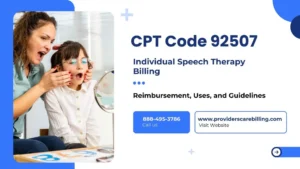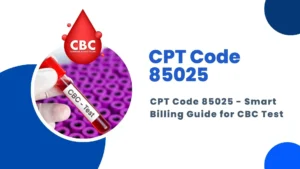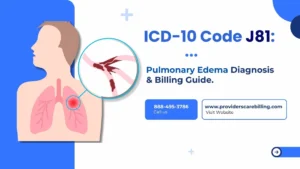When someone has a brain injury, memory problems, or sudden behavior changes, doctors need more than just a quick test to understand what’s going on. That’s where CPT Code 96116 comes in. It is used for a special check-up, called a neurobehavioral status examination.
This code secures the best outcomes for patients. But especially for those who have suffered from traumatic brain injuries (TBIs), seizures, or cognitive impairment. It also supports clinicians in constructing perfect assessments and precise interventions for optimal recovery and rehabilitation.
Before knowing its importance, let us know what it actually is.
What is CPT Code 96116?
According to the 96116 CPT code description, it pertains to a structured clinical assessment, as defined within a “face-to-face” interaction with a patient. During the initial hour, it comprises:
- Clinical interviews
- Testing of the following cognitive domains: attention, memory, language, reasoning, and visual-spatial skills
- Behavioral observations
- Analysis and detailed reporting of the interpreting results
For sessions lasting more than an hour, additional time will be billed at an hourly rate using add-on code 96121.
In 2008, CMS made the optional reimbursement of telehealth services 96116, GT, and GQ, which allowed for both in-person and telehealth consultations. This is especially useful for providing mental health evaluations through CPT coding to people living in remote or underserved regions.
What is the Importance of the 96116 CPT Code?
Supporting Diagnosis and Care Pathway
Thorough evaluation of this code serves as a backbone for enduring neurological conditions. These are most likely to include traumatic brain injury, stroke, or seizure disorders. While quick assessments like the mini-mental status exam CPT code provide some insight, but on the other side, they do not capture the whole picture. However, this CPT code for neurology covers a lot more detail through various layers of cognitive function, emotional status, and behaviors, equipping clinicians with the needed data to make accurate assessments.
For cognitive impairment ICD 10 cases, pairing the appropriate ICD 10 codes like R41.81 or S06.x with 96116 helps establish medical necessity, which supports proper diagnosis and compliant billing.
Defending Neurological Services with Research
Research shows that around 54 to 60 million individuals go through a traumatic brain injury each year in the world. Research repeatedly underscores that cognitive deficits, if not assessed or treated, in TBI survivors diminish quality of life, increase healthcare costs, and impede rehabilitation. Mental health assessments coded as CPT 96116 prove that clinicians can:
- Plan for rehabilitation
- Objectively track recovery milestones
- Measure and compare baselines over time
- Justify resource allocation for therapeutic services (speech therapy, occupational therapy, cognitive rehabilitation) billed under relevant codes, including mental health assessment CPT, cognitive impairment ICD 10, and even CPT code seizures if warranted.
Enabling Telehealth Assessments
Telehealth reimbursement has made great strides since 2008, and CPT Code 96116 has contributed to that progress. A full neurobehavioral assessment can be performed remotely with the appropriate GT modifier (for live interactive) and GQ (for asynchronous).
This is a game changer for patients living in remote areas or regions without neuropsychologists and where comprehensive neurological services are otherwise impossible.
A Catalyst for Interdisciplinary Care
Within comprehensive neurological services, coding 96116 is the starting point for more complex care. A clinician can:
- Identify depression, anxiety, behavioral changes,
- Refer to neuropsychology or rehab,
- Integrate CPT code seizures or other diagnoses,
- Coordinate multidisciplinary care teams (neurology, psychiatry, social work, OT, SLP).
It increases the care quality and improves patient recovery.
Population Health and Research Implications
The combination of CPT 96116, other codes, TBI ICD 10 code, and h0015 augments macro-level medical research and public health evaluation. Accurate claims data improves:
- Map TBI and dementia trends over time,
- Allocate funds for brain injury rehab.
- Guide policy and public awareness campaigns focused on cognitive recovery.
This is especially important in countries like Pakistan, aiming to improve dementia and TBI care via enhanced research and neurology training.
Billing Clarity and Accurate Documentation
Using 96116 properly requires precise documentation. Medicare and private payers demand:
- ≥ 31 minutes billed for the first hour,
- Clear documentation (time logs, test results, and written reports),
- Evidence that the exam influenced care decisions (medication adjustments, rehab goals, safety planning),
- Supporting ICD codes like the ICD-10 code for traumatic brain injury or seizure-related codes.
Proper billing prevents denied claims. If MMSE is part of the visit, it may be noted, but it shouldn’t be billed separately if included in 96116.
Why Does It Beat Short Scales Like MMSE Alone?
The mini-mental status examination CPT code is billed for a session lasting 5 to 15 minutes during which the patient is asked to be oriented, recall some items, and pay attention. Though helpful, 96116 is more beneficial as it provides additional value by deepening the understanding of:
- Greater insight into executive function, planning, judgment, and emotional processing
- Behavioral observations not captured by MMSE.
- A written narrative and interpretation by a clinician
- A billing structure that mirrors the care
Unlike neuro CPT codes 96125 for targeted cognitive assessment or 96132/33 full neuropsychological testing, 96116 provides a comprehensive clinician-guided model.
Hypothetical Example
Situation
A 55-year-old man was in a motorcycle crash. Since then, he feels dizzy, forgets things, and has mood changes. His first CT scan looked normal, but he still has trouble thinking clearly.
Actions
- Conduct a mini-mental status exam that shows mild impairment.
- Proceed with 96116: 60+ minutes of testing, behavioral observation, and clinical interviews.
- Interpretation leads to a report recommending cognitive rehab, mood therapy, and follow-up imaging.
- Bill 96116 + 96121 if the duration is more than 60 minutes.
- Pair with S06.0X1A for the head injury (TBI) and R41.81 for memory and thinking problems. Add seizure codes if seizures are present.
Outcome
Improved safety planning, targeted interventions, and clinician-backed documentation demonstrate an impact on yielding better patient outcomes and minimizing billing risk.
Fact: Globally, TBI impacts around 60 million people annually.
To further support patient care after a neurobehavioral evaluation, it’s important to choose the right behavioral counseling approach. Explore the differences between H0004 and H0005 to understand how individual vs group counseling is billed in mental health settings.
Final Thoughts!
Helping someone with brain or behavior problems takes time, care, and the right tools. CPT Code 96116 is one such tool that lets doctors do a full check-up on how a person thinks, remembers, and feels. This is more than just a short test; it gives deep information that helps doctors plan better treatment.
As it can work with other important codes, providing the right treatment and getting insurance coverage becomes easier. If your clinic or hospital wants to offer top-quality, comprehensive neurological services, then using CPT 96116 is a wise choice.





